Robert Fripp is a guitarist best known as the driving force behind the mighty progressive rock band King Crimson. He has also collaborated with David Bowie (think of the heavenly sustained guitar in the song “Heroes”), Peter Gabriel, Daryl Hall, Andy Summers, and many others. And starting with his early recordings with Brian Eno, he also pioneered the tape looping system Frippertronics, creating ethereal soundscapes and ambient pieces. Fripp greatly expanded his audience during the pandemic in a series of quirky videos with his wife Toyah.
David Singleton is Fripp’s “reluctant manager”.
Well, of course, David Singleton is much more than this. He is also a producer for the music of King Crimson and for the recent acclaimed documentary “In the Court of the Crimson King”, an audio engineer, author of The Vicar Chronicles about the music business, co-founder of the Discipline Global Mobile music label, and a musician himself.
This interview was for a preview article for noozhawk.com for Fripp and Singleton’s talk “An Evening With Englishmen Abroad” at the New Vic Theatre in Santa Barbara on 3/1/24. It was done by phone on 2/14/24.
Jeff Moehlis: Have you or Robert been to Santa Barbara before?
David Singleton: Yes, in fact I did a book tour for The Vicar Chronicles, the books I wrote, and we passed through Santa Barbara. I definitely have been there before, as I am sure has Robert. I doubt we’ve actually performed there before, in any way. I don’t remember seeing Santa Barbara on a tour schedule before, so that’s fun.
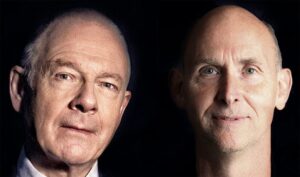
JM: Can you describe what this event is, what people can look forward to?
DS: Well, this is an open evening with Two Englishmen Abroad. It’s a chance for us to answer questions that people come to ask, and actually to address questions that interest both Robert and me anyway. I think we both find it fun because it is a very open evening. We don’t come with an agenda. We have lots of things we can talk about if the audience aren’t inspired to take us off in interesting directions. But when we did a tour on the East Coast before, they were most exciting in fact when you were taken off in directions you hadn’t considered before.
The idea grew out of the pre-show talks that I used to do. So when King Crimson toured, I used to give a talk to 60 or 100 people who came in early, which was introduced by Robert, and then I gave a talk and I introduced one of the other band members. And both Robert and I thought that we would be interested in taking that concept further, further than we could handle the night of a concert. Because on the night of a concert, certainly Robert is not able to engage seriously. This sort of thing would distract him from the playing that was coming up, and I had other responsibilities and limited time. So we wanted to develop that idea, and this is a chance to do it.
It’s an improvised evening, would be the best way of putting it. You know, if you came to two nights, I don’t think you’re going to hear us discussing the same things. In fact, I’ve listened back to recordings of what we did last time around – they go on for about two hours – and you could listen to everyone because what we talked about was entirely different every night. So this isn’t sort of a pre-rehearsed ritual where we’re going to come and promote something. This is an open evening, loosely talking about music. My favorite comment that was made was from somebody who came to the show in New York, and told me afterwards that it was astonishing because there wasn’t any music – it was just people talking about music – but “when I left, I had music in my head as if I’d been to a music concert.” So I love the chance to explore what is this magical thing which we’re all obsessed by. What is music? Probably everybody who comes will have had an epiphany, a moment when music was the unique thing that spoke to them in their lives. It’s wonderful to explore what it is. Why does music have that power? Robert said to me, “Well David, what are you going to talk about in your introduction?” I said, “Music is the language of the soul. Let’s see where that takes us.”
JM: What are some of the stranger questions that you’ve gotten?
DS: Oh, gosh. I remember being asked about the role of silence, which I wasn’t expecting, which was fun to answer. We get asked things about our own lives. I remember giving an answer about the nature of marriage, which was entirely unrehearsed because I hadn’t thought about it before. And somebody wrote back and quoted it to me and said, “Oh, it was wonderful. You said this…” You get ones about the music industry. Robert is asked about stories from his past, which are always entertaining. It goes pretty much everywhere, and we encourage that. I don’t want to scare people off. Come with whatever is in your head and come ask it.
The other thing I’ve learned, I’ve noticed this when I watched the past shows, particularly when you do get asked the questions that you think are fascinatingly strange, is that Robert developed a wonderful habit of saying, “Good question. What do you think David?” [both laugh]
JM: Of the questions and answers that you’ve been a part of, what has surprised you about Robert?
DS: Oddly enough, I was not surprised… There were various reasons why I was very keen to do this. One of the reasons was that I think Robert speaks about music, and the role of the musician, and the relationship between the musician and music and the audience, he has thought about that and speaks about it I think more clearly and beautifully than anyone I know. So part of my agenda was to find a space where that might happen, and people could hear Robert talking about it. So I’m not surprised by what I hear, because I know these are things that Robert has thought, and I’ve heard him say some of them before, but it’s wonderful to hear Robert constantly exploring what is the nature of that relationship and how does it work. Where does music come from? What do musicians do? How does music come into the world? The act of composition. Probably those are the bits that live with me, because I think there’s a truth in them, and they resonate with the audience.
I think Robert and I hopefully complement each other, because Robert speaks incredibly well about that, and the part that I suffer with, which is probably well-known to all the wanna-be artists in the audience, which is probably most of them I would argue, is what I describe as bridging the gap. What it takes to take the perfect idea that you have in your head, the perfect conception, the perfect newspaper article that you haven’t written yet [laughs], what it takes to take that and bring it into the real world, where inevitably it’s imperfect. Your perfect conception in your head, the thing that you produce in the world, you know, the record that you put out, is not perfect. There is always an imperfection in the translation between the one and the other. That is, I think, a problem that most artists wrestle with on a daily basis. And I find that, probably, is my daily grind, particularly when you’re a producer of records. It’s exactly that. You’re trying to translate a perfect concept into a thing that you can actually release, a physical thing that people can listen to. It’s never perfect. You talk to any artist. The things that we think are perfect when we listen to them, you talk to the artist and they hear the flaws. If you hear Paul McCartney talking about the Beatles recordings, he’ll say, “Oh, there are all these mistakes, and things we didn’t intend. And we don’t like that bit, and we don’t like that bit.” Robert will say the same thing about all the early King Crimson recordings. I would say the same about every record that I’ve produced. They’re always dragged out of your hands because you’ve hit the deadline. It has to be done today, and, well, that’s what I have done today. And it goes into the world. There’s this phrase: they’re perfect imperfections. To everybody else it probably is perfect, but to the people who made it, it never is. So I think talking about that and trying to help people who are trying to produce their own things, to see that and get over that hump is, I think, something else that is interesting to do.
JM: How did you come into the King Crimson family?
DS: The moment that I first met Robert was when he sacked the sound engineer halfway through a Guitar Craft tour. It was in 1989. I was producing a record in a studio in Cranborne, that happened coincidentally to be the one that Robert used. Robert phoned the studio owner to say, “Do you know anyone who would be capable of doing the job, and would be free in two weeks time?” And he turned around to me and said, “David, what are you doing in two weeks time?” And I said, “I’m free”, and he said, “Fine, do you want to go and work with Robert Fripp?” So I actually met Robert very briefly at his mother’s house in Wimborne, and then I flew out to Seattle to do the second half of that tour. Interestingly enough, following that moment, I’ve worked on every recording Robert worked on until the Construkction of Light in 2000, which I’ve later worked on. But I was away on that one. But I think every other recording that Robert did after that, I was there. So we evidently got on!
JM: So it worked out! It’s well known that Robert has had problems in the past with the music business, management, and so on, and you’ve lasted in this relationship for decades. How do you approach working with Robert and King Crimson, and what’s the secret to have made this work so well?
DS: Robert and I get on very well because we share the same aim. Our aim is quite simply to do right by the art, to do right by the music. So in a sense, the music comes first. What can we do to make the music as good as we can possibly make it, and to bring it into the world in the best possible way. And if you start with the same aim, then usually your thoughts are aligned. So I think when Robert has fallen out with people in the past, it’s because that wasn’t their aim. You probably know that he publicly fell out with his first managers when they tried to sell his music catalog because they needed to raise money. Well, that wasn’t the nature of the agreement, it was meant to be co-owned by the artist, and this music is not meant to be a bargaining chip to help you raise money because your company is short of money, and pass me on like a slave to somebody else so they now own me.
So I think generally when Robert has fallen out with people it’s that, or possibly with managers who tried to make Robert do things that he naturally doesn’t do. I find him very easy to work with, because Robert is very, very consistent. There are things that he likes to do, there are things that he doesn’t believe he should be doing, partly in the nature of publicity, actually. When you’re doing a tour, Robert won’t interrupt himself to go and do interviews, because it actually interrupts his process while he’s on tour. He will do interviews, but entirely separately, as a separate piece of work. As in, “right now this month I’m doing interviews, I’m not doing anything else.” He won’t sort of casually do an interview in the middle of something else. I imagine some managers wanted him to do it. But, actually, I’ve accepted it. It’s perfectly coherent, what he wants. So you don’t try to push water uphill. It’s a lot easier.
But, mostly, I think it’s that we share the same aim, which is that the music comes first. And thus far, it’s done us very well. It’s surprising. We formed the label DGM together to put out the music of King Crimson and Robert and me, and we do exactly that. So we don’t look at the budget. We say, “This is what we have to do. This is the piece of music. We’ll do it. We’ll spend whatever is necessary to make it as good as we possibly can. And then we’ll put it out into the world.” And at times it means that you probably spent far more time than would’ve been in any way sensible had you looked at matters the other way around. But, I would argue that it’s also a very commercially sensible idea. You won’t get super-rich, but generally if you put out music that you have made for the right reasons, with love and because you believe the music has value, the world notices it and supports you.
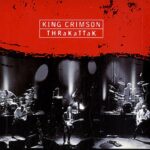
I remember there’s an album Thrakattak in the mid-1990’s, where interestingly I can’t now tell you whether it was either Robert or me who had the idea, you’re together so long that actually your ideas become the same ideas, but the idea was that we would take these one or two minute improvisations that the band were doing in the middle of the piece “Thrak”, sow them together to make what would appear to be a one-hour improvisation. So we did this because it seemed like a fun idea. We did it, we put it out, and at the end of the year we were having a meeting with our accountants. I always remember them asking me. They said, “David, what market research did you do before you made the album Thrakattak?” And I suppose that the fact that we laughed at that question shows that that is simply not how we go about things [laughs].
JM: Of course, I have that album.
DS: Well, there we go. It is what it is. We thought it’d be fun. We assembled, and bits of it I think are still wonderful. Actually, lots of it’s still wonderful.
JM: Do you have any guess how many hours of recordings have been put out over the years, you know, the studio recordings, the box sets, the official bootlegs?
DS: Now you’ve asked me a question I don’t know. I’m always astounded by the box sets. I might misquote myself now, because for various copyright reasons I have to go in and assess what music is in there. I think there’s something like 20 days worth of music. I was adding up one of these box sets, all these various versions, and all these things [laughs]. It was certainly multiple days worth of music in one box set. And obviously we’ve put out about ten of those now. We’re trying to put out every live show of which we have a recording on the website. We’re just completing it. So we will have done 50 Club releases, 50 shows that have been released to the Collectors’ Club. Plus all the mainstream albums.
There must be a shockingly large amount of King Crimson in the world [both laugh]. But our intention, certainly with the website, is to make everything that we have available. That has a number of benefits. Firstly, I think it’s good to do anyway. It means if you went to a show, hopefully you can go and find that particular show. Whether we think it was wonderful or not, if you went it’s there. But it also has a hidden benefit for us, because it does mean that we go back and listen to every recording.
In a sense, of all this music that’s out there, you can think of it as a pyramid, of which the bottom layer would be the website, where simply everything that’s ever existed we will put it there. But in doing that you will find, you know, of the ten shows, this was much the best one, so that one might then get put out, for example, in the Collectors’ Club or somewhere, so effectively that moves up a level. And then the same thing will be true in the streaming world. We might say, “Well, OK, these ones are better, so we’ll move them up”, and then you get to the official live releases. So in a sense it means that there is a pyramid. I don’t know how successful we’ve been on the streaming services, but I always try to maintain that pyramid so it’s intelligible to a new fan. Because otherwise, given what you’ve just said, you know, oh my God, there’s 100 days worth of King Crimson music out there, I don’t know how many hours that would be. What am I meant to listen to if you’re a brand new fan? But actually there is a pyramid, to which the answer would be to start with these three or four studio albums, and if you like those, once you’ve done the studio albums, then these are the live albums that we would recommend. So effectively you’re not blinded by, there’s so much stuff I don’t know where to begin.
JM: That makes sense.
DS: If you’re a new fan, begin at the top of the pyramid, I would suggest.
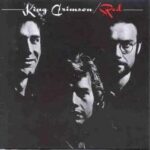
JM: My favorite King Crimson album is Red, which, it’s hard to believe, turns 50 years old this year. Is there anything special in the works to celebrate that? I know there’s already been the box set Road to Red.
DS: The good and bad of Red. Oddly enough, this is fresh news, it came through my inbox this morning. You may know that with Larks’ Tongues in Aspic, we went back and we released all the sessions from that album, so you could hear all of the different takes. Slightly fortuitously, in fact, I invented an Elemental Mix. I went back and we created a new mix of the existing tracks, looking at them differently. Looking at them more as if they were takes, rather than perfectly mixed as finished pieces. A fresh take on the existing material. And part of the reason for doing that is copyright reasons, in that the copyright laws stipulate that if you haven’t released something within 50 years, it falls out of copyright. So we deliberately said, OK, we’ll release all of the music so that it remains in copyright.
So we have been looking at Red, and the original studio multitracks have been lost. There must’ve been a series of takes. Maybe they were just recorded over. It’s probably the only album for which we don’t have multiple reels of all the original takes of all the tracks. So everything we have of Red are the five tracks that appeared on the final album. So we will be go back… I mean, I’m sure we’ll be doing an Atmos mix, because we’re doing that of everything. So there will be an Atmos mix, and I will probably go back and see to what extent I can unpick the multitrack and get it back to a sense of performance, as in, here’s the original take which would’ve been probably just the bass, drums, and possibly guitar, and here’s the first set of overdubs, so you can hear it in a fresh way. But there isn’t as much exciting unreleased studio material as there has been actually on all of the other albums up to date. I am sure, however, we’ll be doing our best to go and see if we can go and find a reason for people to celebrate Red’s 50th anniversary. That one piece is one of the very first pieces of King Crimson that ever spoke to me. I love “Red”.
JM: Maybe this is overstating it, but it’s like the burning of the Library of Alexandria. Everything got lost, including all the outtakes from Red.
DS: In a way we’ve been very lucky, I think, because you hear stories of much more recent bands, who they want to go back and do something and the archives are lost. So there, in a way I suppose, are remarkably few things missing from our archives. But there must’ve been all of the other takes of Red. We’ve just got an assembled reel with the final version of each one of them. There must’ve been outtakes. We will rattle the cages of the various record labels that have had it over the years, to see if somebody’s got those tapes sitting in an archive somewhere, but mostly, I think, we’ve now acquired every tape that we’re likely to acquire. So there will be something, but yes, the Library of Alexandria does not contain wonderful outtakes of Red.

JM: I wanted to ask about the documentary, which I’m not sure if you had anything officially to do with, I’m not sure…
DS: I was a producer on it, but in the artistic sense, you’re absolutely right, I had nothing to do with it. My role deliberately was to not to. We asked Toby Aimes to make the movie, and the only instruction that we gave him was that we didn’t want him to make the fairly cookie-cutter music documentary that gets made a lot, effectively when you see all of the members of the band assembled in the studio somewhere chatting about the old times, cut to a bit of live footage, cut to some critic telling you how good they were, and just muddle those three things up and make a quick music documentary. We said, “We’re not interested in that documentary. Go make something exciting to tell us about King Crimson, and we will leave you artistically free to make whatever you like.”
So my role was to find the money to keep making this documentary, which sadly became much more expensive to make than we thought it was going to be, and to get him access to whatever he wanted access to. But artistically, it was actually to stay out of the way and say, no, it’s you’re movie. Because otherwise, I think if a band makes a movie about themselves, well, it’s not going to be very insightful. It’s certainly not going to contain the nasty bits that the band might not want in there. So the idea is this is him, it’s real, it’s raw. And I think it’s a very truthful documentary. Not necessary truthful about King Crimson, but truthful about musicians, what it takes to make music. Because poor Bill Rieflin died during it, and it’s also very touching about life and death. I think it’s a very real documentary.
JM: Do you think it really captured some essence of King Crimson, and the philosophy behind the music?
DS: Yes, I do. Robert has always found the movie wanting in that regard, in saying how much does it tell him about King Crimson. But I know it’s introduced a lot of people to King Crimson, so it certainly is a fantastic gateway drug. As in, I know a lot of people who’ve seen it have now gone off to explore what is this wonderful thing King Crimson. For any movie to actually explain what is the philosophy behind music is probably very complicated. We’re now almost back to Robert and me on our talks, which wouldn’t necessarily make for a very interesting movie, in truth. But I think it does work very well as an introduction to King Crimson. I think it’s an incredibly good movie to watch. It’s a movie about music and musicians to me. Music, musicians, and even life and death. It’s been widely touted. A few reviews have described it as one of the best music documentaries ever, which is wonderful. To me, it’s just a documentary. As in, cut the music bit, it’s just a great documentary.
JM: Maybe you have data on this, it’s just my sense. I feel that King Crimson has translated well to the younger generation, and not every progressive rock band has enjoyed that. Do you have any sense if that’s true, and why has the music of King Crimson translated like this?
DS: It is true that the nature of the audience changed during the time of the last incarnation. When they started in 2014, if you’d gone to a concert, you were pretty much seeing what you might’ve expected, the older generation that had grown up with King Crimson. Wonderful shows, but that would’ve been it. Very male, and older, roughly the same age as the band, I suppose. Whereas by the time they finished, that was no longer true. Probably half the audience remained the core audience, but possibly a quarter of the audience became women, and lots of young couples. I remember watching the band in Italy, and there were lots and lots of young couples there. In fact, I think in the movie there’s a picture of the audience. So yes, in terms of the live band you’re right, and we could see a progression year after year as a younger audience came in. I’m not sure why traditionally King Crimson have been a very male-orientated audience, but it had been evidently. But certainly that also changed. So it became more mixed and younger, which is wonderful to see.
Why? I suppose is not necessarily for me to answer. I think because there’s something very real about the band, and almost coming back to what I said about when we release music, I think that music lovers can tell the difference. Music lovers know when something is real. When something is real, people notice it. They may not use that word, but they find it. I think King Crimson has always put the music first. This is not a band that’s just going through motions, playing their hits so that people enjoy them. They were trying to give people a true musical experience, and I hope that’s why people are fans. People came and they liked it.
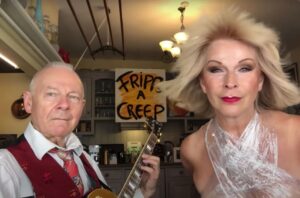
JM: I also want to ask about the videos that Robert did with Toyah during the lockdown. I looked forward to when those were posted. They really took off to an extent that both you and Robert found surprising. Do you have any sense that they would become the phenomenon that they did?
DS: I had very little to do with this. This actually is purely driven by Toyah. It was her view during lockdown that they are performers, and performers have a duty to entertain people, particularly during lockdown when most desperately needed it. So I think it was Toyah who originally said to Robert, “Here is your tutu, we’re going to the bottom of the garden and we’re going to dance to Swan Lake.” And, God bless him, he was up to doing it. He will say yes to doing things for his wife that he won’t say yes to doing for anyone else. And in this country [the UK] there were two big internet breakout things that happened during lockdown. One was I think Sophe Ellis-Bextor who had a kitchen disco, I don’t know what it was called, which garnered a following. And the other was Robert and Toyah. I think 128 million people have watched them in total. It became a phenomenon.
Similarly, it because a phenomenon because it was fun and real. In a sense, the production value, or you could even argue the lack of a production value, was part of the appeal. “Hey, here we are, we’re in our kitchen on Toyah’s iPhone with not great sound, often, sitting and playing. We’ll play songs that we like and we love.” So it was real, light-hearted, and honest. Similarly, I think people noticed that and enjoy it. It remains a phenomenon. They went and toured last year, and I think they’re doing it again this year, Toyah and Robert, taking it live, which works very well. For me it’s only half of the appeal. When they play those songs live, because now they have to have a band and it becomes more like a conventional show, it loses part of the appeal, which was that it was these two wonderful people in their kitchen.
JM: Your job is to make everything sound the best that you can. When you watch these videos do you cringe a little bit, because the guitar sounds a little thin?
DS: As I said, oddly enough, the lack of the production value is part of why they work – his guitar through the little amp now being recorded on the microphone on an iPhone. They wouldn’t be any better, in truth, for having a better production value. That is what they are. They are two people in their kitchen. It sounds like two people in their kitchen.
There was a while when I didn’t watch them, oddly enough. I was one of the people who wasn’t. Partly because, you know, I see Toyah a lot. We go to dinner with Toyah and Robert. There was a period when I thought, “I don’t know if I want to watch this, because I’m getting to see more of Toyah everytime I watch.” [JM laughs] But then you get over that, and it is what it is.
JM: I will say that I was surprised in some of the early videos, like, wow, do they have some of these costumes just around the house?
DS: I have a little compilation, which I think we’re going to play before we come on at the talks. She was incredibly inventive. Actually, when you start viewing the back-to-back, because they’re not the same, constantly there are different costumes that she managed to find. You’re right, she was actually finding them during lockdown, so somehow she must’ve been making these herself. I suppose you could order things on Amazon. But yes.
JM: This is actually something I actually asked Robert and Toyah during lockdown, as one of the “burning questions”. What advice would you give to an aspiring musician?
DS: Not to lose the power to believe. That, I think, is the most important thing. That’s the philosophical way of putting it. You could rephrase that as “keep going”. You have to believe in what you do. If you don’t believe in it, nobody else will. So you have to believe in what you do, and assuming it has value to you, you have to simply keep going. That is, to me, the overriding thing to do.
I can make that longer, which is if you go back where I started with bridging the gap in trying to bring this music of this aspiring musician to the world, there will be a point where it feels impossible, or unsatisfactory, or you’re not happy with it. Which is halfway, as in it’s exciting when you begin and the energy drives you forward, and actually when you get near the end, because you know you’re near the end somehow it’s like a race, you have a spurt to the finish. But right in the middle, bluh. “I began this project, but my goodness, it’s not going the way I wanted it to go, and it feels a long, long way away, and I don’t know how it’ll ever get finished.” I think you have to know that everybody, however famous, whatever, everybody has that moment. So if you know that, know that everybody gets to that dark moment halfway through when you think that it’s impossible, and keep going. All you have to do is keep going. Just keep going, keep moving forwards, moving forwards, and eventually the impetus will come back. I can speak about this really knowingly, because I suffer from this myself. This is not a successful person lecturing other people. This is somebody who is still suffering these problems. I think holding on to the power to believe, and keeping going are the most important things that anyone can tell you.
JM: Very nice. What’s the alternative, right?
DS: The problem is, I think a lot of people think “Well, tomorrow.” Or, “I can’t do it now”. There’s always a million reasons why not, aren’t there in life? That’s the problem. And you can invent them. And half the time you don’t have to invent them, because we have a day job, you know, “I’ve got children”. There’s always reasons why art doesn’t come into the world. Very real reasons. But I think you have to decide that this is what you are, and you are going to keep going and overcome these things, and not allow them to get in the way. It’s not a fun thing, necessarily, being an artist. I’m not saying it’s horrible either. If you can make sense out of what I said, and can make it coherent, please, your interview has just done a circle. You’ve come back to what Robert and I might talk about.
JM: One of the more memorable answers I’ve gotten to that question is from John Doe, from the Los Angeles punk rock band X. When I asked him that question, almost immediately he said “quit”. Then he said, “But the people that you tell them to quit, and they’re like, ‘no, I really have something to say, and I want to keep goin’, those are the ones who should do it.
DS: If you’ve had an answer from Robert, it’s exactly the same answer. Robert’s answer, worded differently, is exactly the same as that, which is “do something else. Don’t become a professional musician. Don’t do it. And the people who have to do it will have to do it, because that’s what you are. You have no choice.”
I think my assistant here was a plumber, and when he first came Robert said, “Why didn’t you just carry on and be a very good plumber?” And there are people who can’t do that, because that isn’t what they are. Music is what they have to do. You’re right, I quite agree. That’s a perfect answer. Those are the people who have to carry on. If you have no choice but to carry on, then that is who you are. You’re quite right, that’s a very good answer.
JM: Any other things from the archives in the works right now?
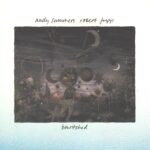
DS: The two other things that I’m currently working on are Summers / Fripp. We now have those albums back. They were licensed or owned by Universal, so we now control those album. And I have just finished doing new mixes, and Surround Sound mixes of the two albums that Robert did with Andy Summers. On those tapes I’ve also found 13 unreleased tracks, so there’s almost a third unreleased album. So Summers / Fripp, I’ve been working on.
We’ve had new mixes done of Sunday All Over the World, the album that Robert did with Toyah and Trey Gunn. So I imagine that will come out this year.
We’ve also gone back over A Scarcity of Miracles, which is the album that sort of gave birth to the most recent King Crimson. It’s [Jakko] Jakszyk, [Robert] Fripp, and [Mel] Collins. I’ve gone back and recreated effectively a long-form version of that album. Originally it started off as soundscapes and improvisations that Robert did with Jakko, that Jakko then turned into songs, in effect. That’s what the album became. And I’ve taken it back again, so that, you know, one of the songs that was a 5 minute song is now a 20 minute version. In a sense, the song is back floating as part of the improvisation, as opposed to being changed into something more formal. So there will be a reissue of some kind of A Scarcity of Miracles. I’m not sure even what we’ll call it, because it’s a reinvention of A Scarcity of Miracles, which is wonderful. The track “A Scarcity of Miracles” itself is wonderful, and “The Light of Day” is wonderful, too, as they all are, but the other ones actually I think I prefer them like that. It feels more organic, and I think that is what they really were, as a piece that feels like an improvisation, then the vocal floats in, then the improvisation carries on, as opposed to trying to make it into something else that was composed as a piece in the first place.
So A Scarcity of Miracles, Summers / Fripp, Sunday All Over the World, and in my own world I’m working on the second Vicar album, long overdue. I’ve been doing songs on that. So there’s a lot going on.
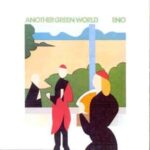
JM: You stay busy! I want to throw this out into the universe. It may not be your purview, but another of my favorite albums in turning 50 years old next year, and Fripp was involved. That’s Another Green World by Brian Eno. I would love to hear the outtakes from that.
DS: Certainly Robert communicates fairly regularly with Brian. Generally, Brian, I think, is very good at moving forwards.
JM: [laughs] Yeah, he may have no interest in that.
DS: So whether he has interest in looking at that, I don’t know. But I’m very happy to float that thought out into the universe, and if we communicate, point out that if you do have outtakes that you wish to do, now might be the perfect time to do them.
JM: You know, the copyright law puts a little pressure on things.
DS: There is this law that if you haven’t released them, they become public property. So in truth, if he does have outtakes from that album that he wishes to release, then technically he would have to release them next year, or hold them forever in your cupboard. It’s a slightly bizarre law. Originally copyright law was 50 years. They extended it, I think, to 70 years. It seems to me that everytime The Beatles were about to fall out of copyright, they’d change the law. That’s pretty much what happens. But when they extended it to 70 years, one of the conditions they put on was that the extension only applies to things that were already released. Boring! Boring stuff.
JM: I find it fascinating. You have to worry about these things, obviously. I’ll save my other questions for the actual event.
DS: Yes, come and ask. All forms are questions are fun. The predictable ones aren’t predictable either, because the answers aren’t necessarily. Robert always uses the phrase “burning questions”, and they are when they are questions that someone really wants an answer to. If there questions that somebody really wants an answer to, they’re always good to talk about. Whatever it is, they’re always good to talk about.
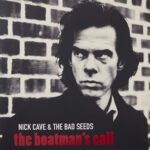
JM: Are you familiar with Nick Cave’s blog [The Red Hand Files], where he answers questions that people write in? He gives very thoughtful responses. They tend to be very downer sorts of questions, to be honest.
DS: Much of what Nick Cave does seems to exist in a parallel universe to us, but in his own unique way. I’m sure that would be interesting. Didn’t he do a speaking tour?
JM: He did a book tour recently, which I think was connected to a music tour. He’s had two sons pass away, so often people write in with their stories of loss and trauma, and he’s so thoughtful, it almost brings me to tears sometimes how he responds to people, and the empathy that he has.
In one of his latest ones, he was doing rapid fire answers, either “Yes”, “No”, or “I don’t know”. And one of the questions was, did the music of King Crimson and other progressive rock bands influence Nick Cave and the Bad Seeds, and he said “Yes”. But he didn’t expand on that.
It seems that people want to know how the people we respect as artists, how they view the world.
DS: They do. That’s part of the role of true artists, actually, to inform us about what it is to be us, to be human or whatever. That’s part of what we see in true artists. They improve our humanity. It’s true of all great musicians, if music speaks to you. Beethoven has enriched my life just by being him and what he does. Well, that’s a good question. Maybe we’ll save that one for show! I think great artists do show us a mirror on the world somehow, so that we see the world more clearly. That is what they do, I think. And Nick is one of those people, he’s a true artist.


Discussion
No comments for “Interview: David Singleton”